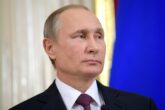March 02, 2022
The Beginning of the End for Putin?
Russian President Vladimir Putin’s attack on Ukraine has been a clarifying moment. Since he came to power in 2000, various Western leaders have tried to cooperate, accommodate, or negotiate with him. But by embarking on a war of choice against a country he claims doesn’t have a right to exist, Putin has forced the international community to see him for what he is: a belligerent leader with a remarkable capacity for destruction. The result has been sweeping new measures designed to constrict and constrain him—punishing sanctions against Russia’s financial institutions, bans on Russian planes over EU airspace, and increased weapons shipments to Ukraine. Even Germany, long reluctant to confront Putin, agreed to exclude Russian banks from the SWIFT financial messaging system, reversed its long-standing prohibition on providing arms to conflict zones, and substantially increased its military spending. Russia’s invasion of Ukraine has sparked nothing less than a sea change in international perceptions of Putin and what must be done to confront him.
Such a sea change could well be underway inside Russia, too. Throughout his tenure, Putin has maintained relatively high levels of public support thanks in large part to his ability to restore economic growth and stability after the turmoil of the 1990s. While most Russians have few illusions about their leader, recognizing the corruption that benefits him and the elite around him, it remained all but unfathomable to most Russians that Putin would launch a major conventional war against their Ukrainian neighbors. For months, many Russian analysts, commentators, and citizens alike were convinced that Putin would not engage in such an act of aggression.
The news of the war and the economic ramifications that followed have led Russians to see both Putin and Russia differently; Russia is not the same today as it was last week.
The prevailing wisdom holds that Putin will be able to survive any domestic backlash. That is most likely true. In personalist authoritarian regimes—where power is concentrated in the hands of an individual rather than shared by a party, military junta, or royal family—the leader is rarely driven from office by wars, even when they experience defeat. That’s both because other elites are not strong enough to hold the dictator to account and because domestic audiences have few opportunities to punish leaders for their actions. But the thing about repressive regimes like Putin’s Russia is that they often look stable right up to the point that they are not. Putin has taken a major risk in attacking Ukraine, and there is a chance—one that seems to be growing—that it could mark the beginning of his end.
Read the full article from Foreign Affairs.
More from CNAS
-
Germany's New Defense Agenda
On April 9th, Friedrich Merz, the leader of Germany’s center-right Christian Democratic Union, secured a coalition agreement with the Social Democrats following his party’s vi...
By Andrea Kendall-Taylor & Jim Townsend
-
Trump ‘Humiliated’ as Putin Sends Clear Message That He Doesn’t Care About US
"Putin is not playing ball." Putin's Palm Sunday attack on Sumy is "embarrassing for the White House" as it comes just days after Steve Witkoff met with the Kremlin, says adju...
By Jim Townsend
-
The Hidden Past and Uncertain Future of the U.S. and Ukraine with Celeste Wallander
Under the Trump administration, U.S. support for Ukraine is no longer guaranteed. President Trump's pause on aid and intelligence to Ukraine in March may have been brief, but ...
By Andrea Kendall-Taylor, Jim Townsend & Celeste Wallander
-
Is Russia Under Pressure?
Since 2014, the United States and its allies have provided increasing military support to Ukraine while imposing more and tougher economic sanctions on Russia, especially sinc...
By Jeffrey Edmonds



